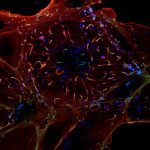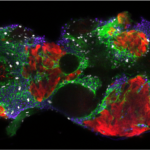Présentation
Inflammatory bowel disease (IBD) is a multifactorial pathology characterized by impairment of the intestinal barrier and an excessive immune response to gut microbiota. The QUOBII project aims to explore the role of bacterial quorum sensing (QS) molecules recently identified in the human gut in the host-microbiota dialogue, and their potential therapeutic interest in IBD. We have demonstrated the presence of QS molecules of the N-acyl-homoserine lactone (AHL) family in the human intestinal ecosystem. We have shown that the most abundant one is lost in IBD patients, suggesting a beneficial role for this AHL. The specific objectives of the QUOBII project are 1) to deepen our understanding of the molecular mechanisms responsible for the barrier-protective effects of AHL in intestinal epithelial cells and to further characterize its anti-inflammatory effects in immune cells, and 2) to analyze how this AHL modulates immune cell recruitment to the epithelium under inflammatory conditions. These questions will be addressed through complementary approaches including cell models of epithelial barrier function, gut-on-chip models combining colon organoids, endothelial cells and immune cells from healthy subjects and IBD patients, and an in vivo model of intestinal inflammation in zebrafish allowing the assessment of intestinal barrier function and live imaging. The project is based on a consortium of three partners who are already actively collaborating. It will lead to a better understanding of epithelium-immune cells-microbiota crosstalk in intestine and contribute to the discovery of therapeutic strategies to limit gut barrier alterations in IBD.








